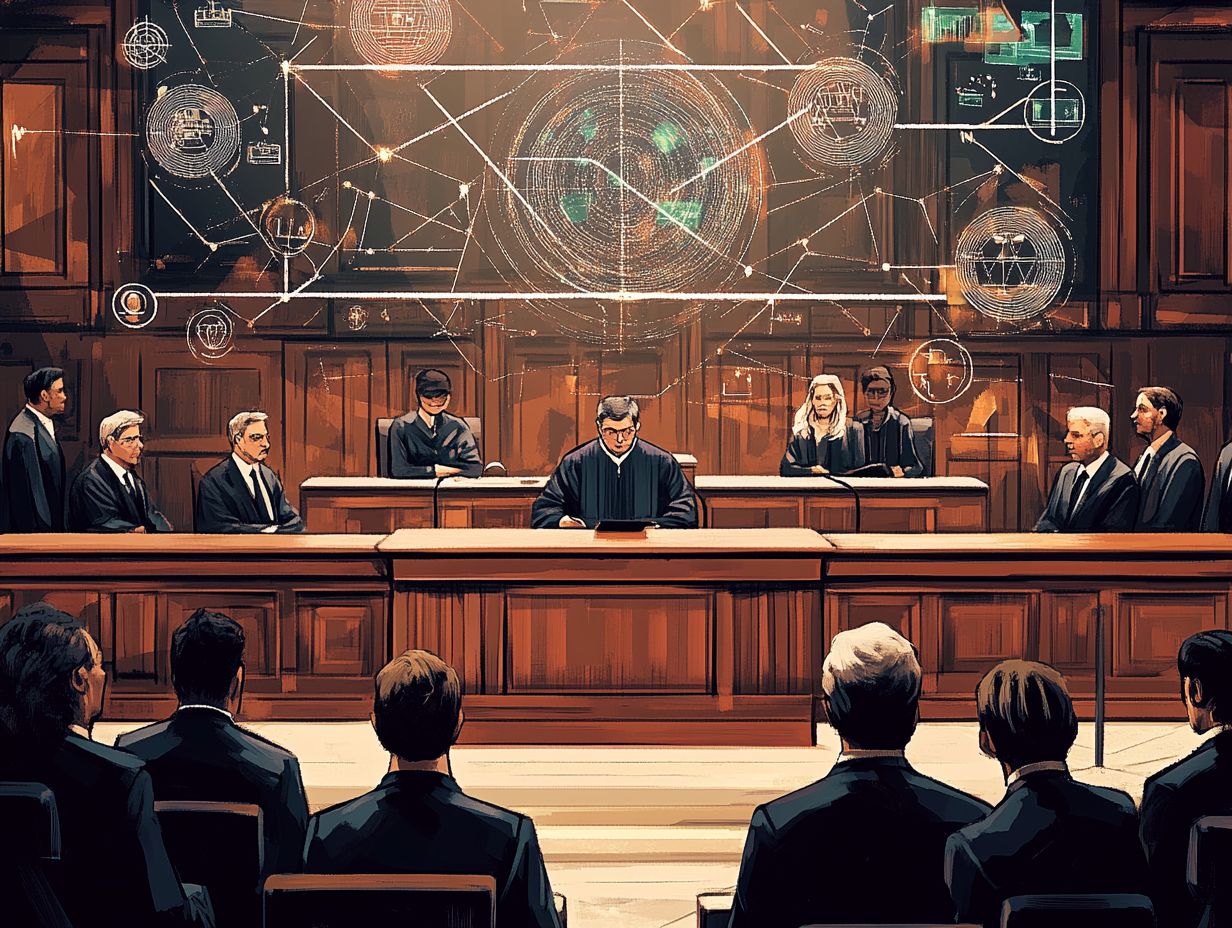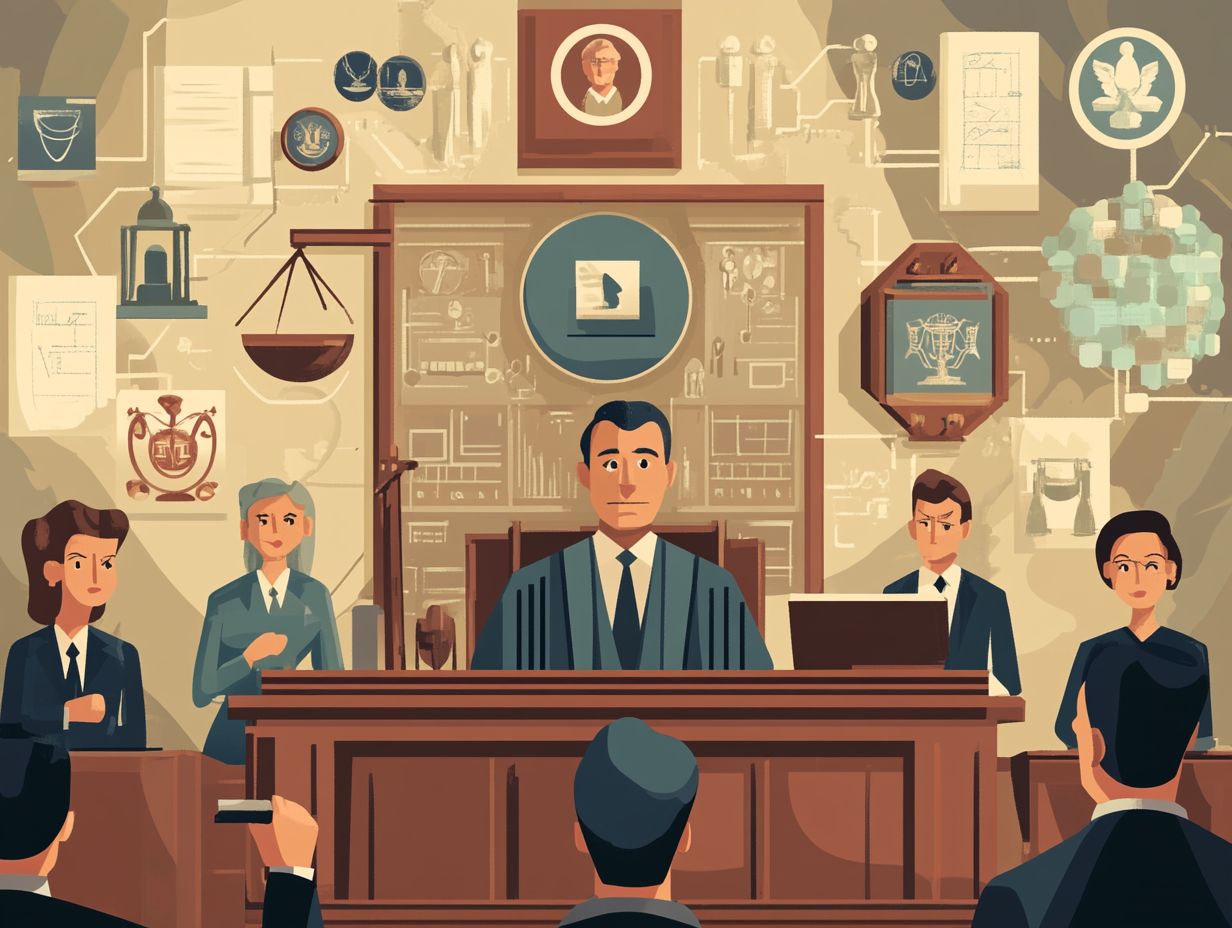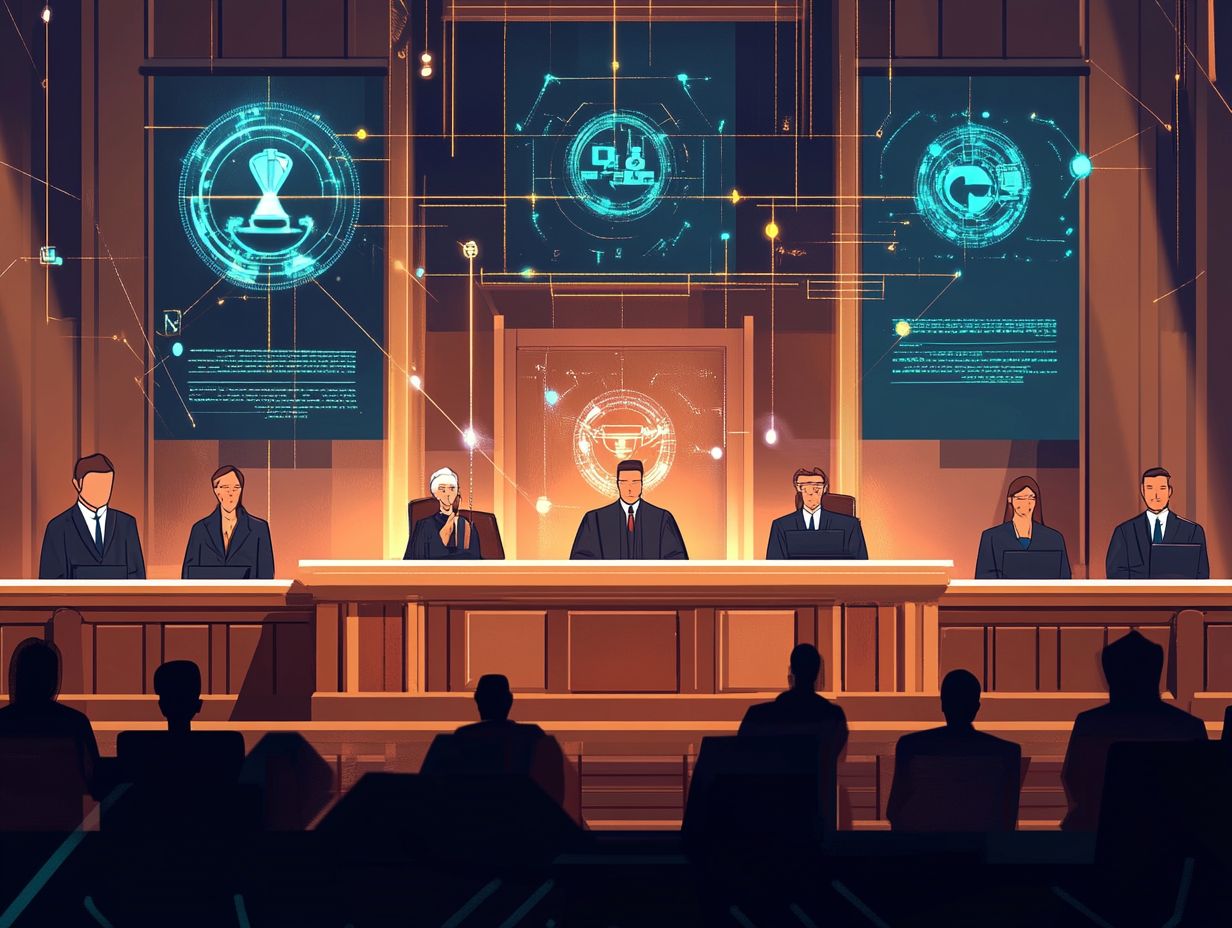What is the Role of IP Litigation?
Intellectual property (IP) litigation is essential for you as a creator or innovator. It provides the necessary protection for your ideas and inventions against infringement.
This article delves into various aspects of IP litigation, defining it and exploring the types of disputes that may arise such as patent, trademark, and copyright issues. You will discover the common motivations driving these legal battles and how they can affect your interests and those of your competitors.
We will also examine the implications of IP litigation on businesses. You will learn effective strategies for navigating the process, as well as alternatives like mediation and arbitration that may serve your needs better.
Join us as we unpack the complexities of IP litigation and its critical significance in today s fiercely competitive landscape.
Contents
Key Takeaways:

IP litigation refers to legal disputes over intellectual property, such as patents, trademarks, and copyrights. Common reasons for IP litigation include disputes over ownership, infringement, and competition in the marketplace. IP litigation plays a crucial role in protecting rights and promoting innovation and fair competition in business.
Understanding IP Litigation
Understanding IP litigation is vital for your business, especially if you thrive on creativity and innovation. It encompasses the legal processes that protect your intellectual property rights, including patents, trademarks, and copyrights.
As global markets evolve, the significance of intellectual property law has become increasingly prominent. Key entities, such as the U.S. Patent and Trademark Office and the Intellectual Property Enterprise Court, play vital roles in safeguarding these exclusive rights.
IP litigation not only shields your creative works but also provides a framework for resolving disputes over trade secrets confidential business information that gives a competitive edge and infringements of patents and trademarks. This protection contributes to economic growth by fostering a competitive landscape, ensuring that your innovations receive the respect they deserve.
Definition and Scope
IP litigation involves intricate legal processes necessary for enforcing and defending your intellectual property rights. These rights encompass patents, trademarks, and copyrights across different jurisdictions.
This field of law covers activities designed to protect the unique creations and innovations you or your business produce. Whether you’re resolving disputes over patent infringement or tackling allegations of trademark dilution, IP litigation is vital for preserving the integrity of your creative assets.
Legal frameworks like the Patent Act and the Lanham Act provide structured pathways for individuals and entities striving to safeguard their intellectual property.
By gaining a deeper understanding of various types of intellectual property, including trade secrets and industrial designs, you can navigate the complex landscape of available legal protections effectively.
Types of IP Litigation
The realm of IP litigation encompasses various types, each tailored to address specific concerns.
You may encounter:
- Patent litigation, which defends innovations;
- Trademark infringement claims that safeguard brand identity;
- Copyright protection disputes that uphold creative works;
- Trade secret litigation aimed at preserving confidential business information.
Each type serves a distinct purpose in the intricate landscape of intellectual property protection.
In conclusion, understanding IP litigation is crucial for anyone involved in creative endeavors. By grasping the essential elements and types of IP litigation, you can better protect your innovations and navigate the legal landscape effectively. For more information, consider consulting with a legal professional specializing in intellectual property rights.
Patent, Trademark, and Copyright Litigation
Patent, trademark, and copyright litigation represent the three primary forms of intellectual property disputes. Each form is dedicated to safeguarding the exclusive rights of inventors and creators in their specific realms.
Patent litigation focuses on legal battles surrounding inventions, shown by the high-profile Apple vs. Samsung case. In this case, these tech titans squared off over design patents and functionality.
Trademark registration protects brand identities. A notable clash is between Tiffany & Co. and Costco over the use of the ‘Tiffany’ name for engagement rings, highlighting the significance of brand recognition.
Copyright protection focuses on the creative works of artists and writers. A prime example is the ongoing disputes in music rights, such as the famous case involving Robin Thicke’s “Blurred Lines,” which sparked debates about copyright infringement and the boundaries of creativity.
Each of these areas is vital in upholding the legal rights that nurture innovation and creativity.
Reasons for IP Litigation

The motivations behind IP litigation often arise from familiar disputes. These can encompass the protection of economic interests, enforcement of intellectual property rights, and resolution of trademark infringement issues. They also include the unauthorized use of creative works.
Common Disputes and Motivations
Common disputes in IP litigation often revolve around trademark infringement, patent disputes, and unauthorized use of creative works. Motivations may range from protecting business interests to addressing violations of the Economic Espionage Act, which penalizes theft of trade secrets.
Disputes can arise in many industries, showcasing the complexities of intellectual property rights and competitive pressures that compel parties to assert their claims.
The implications of these disagreements can be significant, potentially influencing market dynamics and innovation. If a company faces a patent dispute, it risks not only its products but also its reputation and market share.
Organizations can seek resolutions through mediation or litigation, with potential outcomes including monetary damages, injunctions, or licensing agreements. This highlights why your organization must adeptly navigate this intricate legal landscape.
The Role of IP Litigation in Business
IP litigation is crucial for business management. It safeguards intellectual property rights, encouraging innovation and sustaining healthy competition in the marketplace. This ultimately drives economic growth.
Impact on Innovation and Competition
The impact of IP litigation on innovation and competition is transformative for business owners. It encourages investment in research and development while safeguarding intellectual property rights.
This protective environment fosters a culture where businesses can confidently bring groundbreaking ideas to market. Look at the tech sector: companies like Apple and Samsung continuously push boundaries, enhancing their products using the competitive edge that IP protections afford them.
In the pharmaceutical industry, patents play a crucial role, allowing companies to recover substantial investments tied to creating life-saving drugs. Without these legal frameworks, motivation to innovate would likely diminish, resulting in fewer new inventions and reduced market competition.
Navigating IP litigation demands essential steps and strategies to secure successful outcomes. This includes meticulously filing applications, enlisting the expertise of seasoned intellectual property attorneys, and thoroughly preparing for any courtroom challenges that may arise.
Steps and Strategies for Successful Litigation

Successful litigation demands a strategic approach involving thorough research and careful filing of necessary documents. You also need the expertise of intellectual property attorneys to navigate the complexities of trade secret litigation.
A comprehensive understanding of relevant laws is essential in intellectual property cases. Know how these laws affect filing deadlines, claims, and defenses.
Attorneys guide you through the maze of documentation. They ensure every piece of evidence is collected and presented correctly.
Pre-litigation preparation boosts your chances of winning. This includes conducting risk assessments and developing strategies for potential outcomes.
By being proactive and well-prepared, you can achieve a favorable resolution.
Alternatives to IP Litigation
Exploring alternatives like mediation and arbitration gives you effective ways to resolve disputes. These options help you avoid lengthy and expensive legal battles.
They allow all parties to maintain legal protections while fostering a collaborative resolution process.
Mediation and Arbitration Options
Mediation and arbitration offer effective alternatives to traditional IP litigation. These methods allow for quicker outcomes, which helps reduce time and financial strain.
In mediation, a neutral third party facilitates discussions between conflicting parties to find a mutually agreeable solution. Arbitration resembles a private trial, where an arbitrator reviews evidence and makes a binding decision.
Both methods lower legal costs and minimize public exposure of sensitive information. For example, if facing trademark disputes, mediation lets you creatively negotiate licensing terms.
In patent infringement cases, arbitration might be the better choice, providing a definite ruling without the delays of litigation.
Frequently Asked Questions
What is the Role of IP Litigation?
The role of IP litigation is to protect the intellectual property rights of individuals and companies. For those unfamiliar with this area, understanding what to expect during an IP litigation process is crucial, as it involves taking legal action against those who infringe on these rights.
What types of intellectual property are involved in IP litigation?

IP litigation typically involves patents, trademarks, copyrights, and trade secrets. These forms of intellectual property are protected by law.
How does IP litigation help protect my business?
IP litigation helps protect your business from others using or copying your unique ideas, products, or branding without permission. It can also help you recover damages for any infringements.
What is the process of IP litigation?
The process usually involves filing a complaint, gathering information, negotiating settlements, and going to trial if necessary. Steps may vary based on the case and jurisdiction.
Can I handle IP litigation on my own?
It’s not recommended to handle IP litigation alone due to its complexity. Consult with an experienced IP litigation attorney to protect your rights and interests.
Are there alternative dispute resolution methods for IP disputes?
Yes, there are alternative methods like mediation and arbitration to resolve IP disputes without going to court. Mediation is when a neutral person helps both sides talk, while arbitration involves a neutral person making a decision.
These methods can save time and money compared to traditional litigation. You might find these solutions not only quicker but also more satisfying!






